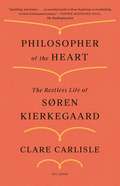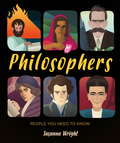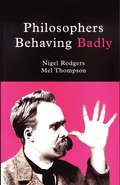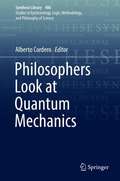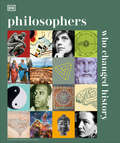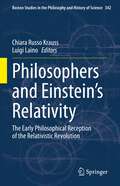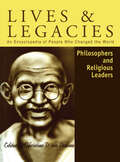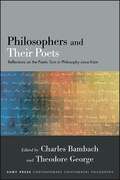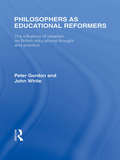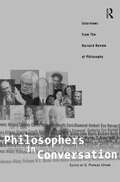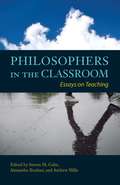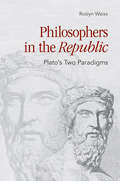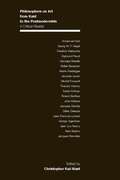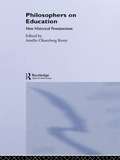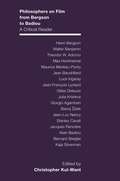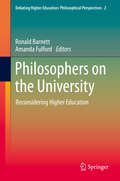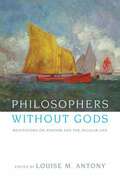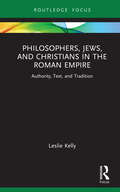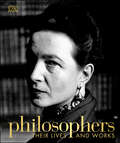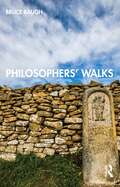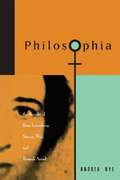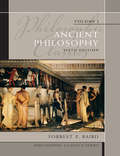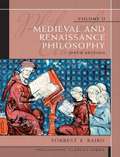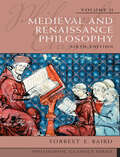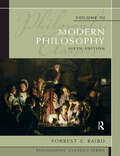- Table View
- List View
Philosopher of the Heart: The Restless Life of Søren Kierkegaard
by Clare CarlislePhilosopher of the Heart is the groundbreaking biography of renowned existentialist Søren Kierkegaard’s life and creativity, and a searching exploration of how to be a human being in the world.Søren Kierkegaard is one of the most passionate and challenging of all modern philosophers, and is often regarded as the founder of existentialism. Over about a decade in the 1840s and 1850s, writings poured from his pen pursuing the question of existence—how to be a human being in the world?—while exploring the possibilities of Christianity and confronting the failures of its institutional manifestation around him.Much of his creativity sprang from his relationship with the young woman whom he promised to marry, then left to devote himself to writing, a relationship which remained decisive for the rest of his life. He deliberately lived in the swim of human life in Copenhagen, but alone, and died exhausted in 1855 at the age of 42, bequeathing his remarkable writings to his erstwhile fiancée. Clare Carlisle’s innovative and moving biography writes Kierkegaard’s life as far as possible from his own perspective, to convey what it was like actually being this Socrates of Christendom—as he put it, living life forwards yet only understanding it backwards.
Philosophers (People You Need To Know #1)
by Susanna WrightThink outside of the box with 20 of the world's brilliant thinkers. Discover the lives of ten female and ten male philosophers from throughout history and from around the world. Philosophers is a perfect introduction to philosophy and some of the most dramatic and world-changing lives that challenged the thinking around reason, race, gender, politics, difference and diversity. Which philosopher felt that thinking proved he existed? Which philosopher wants us to abolish all governments? Who set the groundwork for the feminist movement? Who should we blame for anxiety? Meet Gargi Vachaknavi in India, the Greeks, such as Socrates and Aristotle, then Descartes, Kant, Wollstonecraft, Nietzsche, Arendt, de Beauvoir, Fanon and Piper - just to name a few! Beautiful and characterful portraits help bring to life these important thinkers and their contributions to our world. Clear, concise text presents key philosophical concepts alongside the stand-out biographical information from fascinating thinkers.
Philosophers Behaving Badly
by Mel Thompson Nigel RodgersAn engaging and often hilarious survey of the far-from-fusty extra-curricular activities of some of philosophy's finest practitioners Philosophers Behaving Badly examines the lives of eight great philosophers--Rousseau, whose views on education and the social order seem curiously at odds with his own outrageous life; Schopenhauer and Nietzsche, two giants of the 19th century whose words seem ever more relevant today; and five immensely influential philosophers of the 20th century, Russell, Wittgenstein, Heidegger, Sartre, and Foucault.
Philosophers Look at Quantum Mechanics (Synthese Library #406)
by Alberto CorderoThis edited volume explores the philosophical implications of quantum mechanics. It features papers from venues of the International Ontology Congress (IOC) up to 2016. IOC is a worldwide platform for dialogue and reflection on the interactions between science and philosophy.The collection features philosophers as well as physicists, including David Albert, Harvey Brown, Jeffrey Bub, Otávio Bueno, James Cushing, Steven French, Victor Gomez-Pin, Carl Hoefer, Simon Kochen, Peter Lewis, Tim Maudlin, Peter Mittlestatedt, Roland Omnès, Juha Saatsi, Albert Solé, David Wallace, and Anton Zeilinger.Since the early days of quantum mechanics, philosophers have studied the subject with growing technical skill and fruitfulness. Their efforts have unveiled intellectual bridges between physics and philosophy. These connections have helped fuel the contemporary debate about the scope and limits of realism and understanding in the interpretation of physical theories and scientific theories in general. The philosophical analysis of quantum mechanics is now one of the most sophisticated and productive areas in contemporary philosophy, as the papers in this collection illustrate.
Philosophers Who Changed History (DK History Changers)
by DKThis visual celebration of the world's most celebrated thinkers tells the fascinating stories of their lives and pioneering ideas.This book would be great if you are interested in philosophy, politics, history, and literature or would like to broaden your understanding of philosophy. Philosophers Who Changed History places well-known philosophers in their historical and cultural context, allowing you to see how they came to influence philosophy. In this edition, you can find: -An overview of the lives and works of around 80 of the world's most influential philosophers - from the Classical era to the present-Eight pages of brand-new content with 12 new entries, including Frederick Douglass and Luce Irigaray-Lavishly illustrated portraits of each philosopher, alongside photographs of their homes, studies, and personal artefactsEach philosopher is introduced with a realistic portrait and biographical entries which trace the friendships, loves, and rivalries that inspired and influenced them. Entries explore the key ideas and working methods of each individual and set their ideas in context, conveying a powerful sense of the place and the period of history in which they lived. Philosophers Who Changed History provides revealing insights into what drove each individual to develop new ways of understanding the world.
Philosophers and Einstein's Relativity: The Early Philosophical Reception of the Relativistic Revolution (Boston Studies in the Philosophy and History of Science #342)
by Chiara Russo Krauss Luigi LainoThis book offers an up-to-date insight into the early philosophical debate on Einsteinian relativity. The essays explore the reception and interpretation of Einstein’s ideas by some of the most important philosophical schools of the time, such as logical positivism (Reichenbach), neo-Kantianism (Cassirer, Natorp), critical realism (Sellars), and radical empiricism (Mach). The book is aimed at physicists and historians of science researching the epistemological implications of the theory of relativity, as well as to scholars in philosophy interested in understanding how leading philosophical figures of the early twentieth century reacted to the relativistic revolution.
Philosophers and Religious Leaders: An Encyclopedia Of People Who Changed The World (Lives And Legacies Ser. #Vol. 2)
by Matthew Smith Scott L. Harris Alexandra Honigsberg Daniel Jurkovic Daniel Magurshak Oliver K. Olson G. Thomas Osterfield Christine Renaud Philipp Saltz Christian D. von Dehsen Frederick W. Weidmann K. Timothy Weidmann Mimi YangPhilosophers and Religious Leaders provides a synopsis of the lives and legacies of 200 men and women from the areas of religion and philosophy who have "changed the world." These individuals have developed, extended, or exemplified ideas fundamental to the way human beings perceive the meaning and purpose of their own lives and of their societies. Some have challenged prevailing convictions and worked for immediate change during their lifetimes; others have proposed new modes of thinking that have flourished only after their passing.
Philosophers and Their Poets: Reflections on the Poetic Turn in Philosophy since Kant (SUNY series in Contemporary Continental Philosophy)
by Charles Bambach; Theodore GeorgeSeveral of the most celebrated philosophers in the German tradition since Kant afford to poetry an all-but-unprecedented status in Western thought. Fichte, Hegel, Nietzsche, Heidegger, and Gadamer argue that the scope, limits, and possibilities of philosophy are intimately intertwined with those of poetry. For them, poetic thinking itself is understood as intrinsic to the kind of thinking that defines philosophical inquiry and the philosophical life, and they developed their views through extensive and sustained considerations of specific poets, as well as specific poetic figures and images. This book offers essays by leading scholars that address each of the major figures of this tradition and the respective poets they engage, including Schiller, Archilochus, Pindar, Hölderlin, Eliot, and Celan, while also discussing the poets' contemporary relevance to philosophy in the continental tradition.Above all, the book explores an approach to language that rethinks its role as a mere tool for communication or for the dissemination of knowledge. Here language will be understood as an essential event that opens up the world in a primordial sense whereby poetry comes to have a deeply ethical significance for human beings. In this way, the volume positions ethics at the center of continental discourse, even as it engages philosophy itself as a discourse about language attuned to the rigor of what poetry ultimately expresses.
Philosophers as Educational Reformers (International Library of the Philosophy of Education Volume 10): The Influence of Idealism on British Educational Thought
by John White Peter GordonThis volume assesses how far the ideas and achievements of the 19th century British Idealist philosophical reformers are still important for us today when considering fundamental questions about the structure and objectives of the education system in England and Wales. Part 1 examines those ideas of the Idealists, especially T. H. Green, which had most bearing on the educational reforms carried out between 1870 and the 1920s and traces their connection with the philosophy and educational theory of Hegel and other post-Kantians. Part 2 is an historical survey, concentrating on the innovations in the organization and contents of education in England and Wales brought about by the administrators and educationists educated in philosophical idealism. Part 3 considers what relevance the philosophical and practical ideas of this interconnected group of reformers have to education today.
Philosophers in Conversation: Interviews from the Harvard Review of Philosophy
by S. Phineas UphamThis volume brings together 13 interviews with some of the brightest names in contemporary philosophy, including W.V.O. Quine, Richard Rorty, Stanley Cavell, Hilary Putnam, as well as John Rawls. Covering a wide range of topics from the philosophy of law and logic to metaphysics to literature, the interviews in this text provide an introduction to
Philosophers in the Classroom: Essays on Teaching
by Steven M. Cahn Alexandra Bradner Andrew P. MillsIn these essays, 24 of our most celebrated professors of philosophy address the problem of how to teach philosophy today: how to make philosophy interesting and relevant; how to bring classic texts to life; how to serve all students; and how to align philosophy with more "practical" pursuits. Selected and introduced by three leaders in the world of philosophical education, the insights contained in this inspiring collection illuminate the challenges and possibilities of teaching the academy’s oldest discipline.
Philosophers in the Republic: Plato's Two Paradigms
by Roslyn WeissIn Plato's Republic, Socrates contends that philosophers make the best rulers because only they behold with their mind's eye the eternal and purely intelligible Forms of the Just, the Noble, and the Good. When, in addition, these men and women are endowed with a vast array of moral, intellectual, and personal virtues and are appropriately educated, surely no one could doubt the wisdom of entrusting to them the governance of cities. Although it is widely-and reasonably-assumed that all the Republic's philosophers are the same, Roslyn Weiss argues in this boldly original book that the Republic actually contains two distinct and irreconcilable portrayals of the philosopher.According to Weiss, Plato's two paradigms of the philosopher are the "philosopher by nature" and the "philosopher by design." Philosophers by design, as the allegory of the Cave vividly shows, must be forcibly dragged from the material world of pleasure to the sublime realm of the intellect, and from there back down again to the "Cave" to rule the beautiful city envisioned by Socrates and his interlocutors. Yet philosophers by nature, described earlier in the Republic, are distinguished by their natural yearning to encounter the transcendent realm of pure Forms, as well as by a willingness to serve others-at least under appropriate circumstances. In contrast to both sets of philosophers stands Socrates, who represents a third paradigm, one, however, that is no more than hinted at in the Republic. As a man who not only loves "what is" but is also utterly devoted to the justice of others-even at great personal cost-Socrates surpasses both the philosophers by design and the philosophers by nature. By shedding light on an aspect of the Republic that has escaped notice, Weiss's new interpretation will challenge Plato scholars to revisit their assumptions about Plato's moral and political philosophy.
Philosophers on Art from Kant to the Postmodernists: A Critical Reader
by Christopher Kul-WantHere, for the first time, Christopher Kul-Want brings together twenty-five texts on art written by twenty philosophers. Covering the Enlightenment to postmodernism, these essays draw on Continental philosophy and aesthetics, the Marxist intellectual tradition, and psychoanalytic theory, and each is accompanied by an overview and interpretation. The volume features Martin Heidegger on Van Gogh's shoes and the meaning of the Greek temple; Georges Bataille on Salvador Dalí's The Lugubrious Game; Theodor W. Adorno on capitalism and collage; Walter Benjamin and Roland Barthes on the uncanny nature of photography; Sigmund Freud on Leonardo Da Vinci and his interpreters; Jacques Lacan and Julia Kristeva on the paintings of Holbein; Freud's postmodern critic, Gilles Deleuze on the visceral paintings of Francis Bacon; and Giorgio Agamben on the twin traditions of the Duchampian ready-made and Pop Art. Kul-Want elucidates these texts with essays on aesthetics, from Hegel and Nietzsche to Badiou and Rancière, demonstrating how philosophy adopted a new orientation toward aesthetic experience and subjectivity in the wake of Kant's powerful legacy.
Philosophers on Education: New Historical Perspectives
by Amélie Oksenberg RortyPhilosophers on Education offers us the most comprehensive available history of philosopher's views and impacts on the directions of education. As Amelie Rorty explains, in describing a history of education, we are essentially describing and gaining the clearest understanding of the issues that presently concern and divide us.The essays in this stellar collection are written by some of the finest comtemporary philosophers. Those interested in history of philosophy, epistemology, moral psychology and education, and political theory will find Philosophers on Education to be both an engaging and fascinating read.
Philosophers on Film from Bergson to Badiou: A Critical Reader
by Christopher Kul-WantPhilosophers on Film from Bergson to Badiou is an anthology of writings on cinema and film by many of the major thinkers in continental philosophy. The book presents a selection of fundamental texts, each accompanied by an introduction and exposition by the editor, Christopher Kul-Want, that places the philosophers within a historical and intellectual framework of aesthetic and social thought.Encompassing a range of intellectual traditions—Marxism, phenomenology, psychoanalysis, poststructuralism, gender and affect theories—this critical reader features writings by Bergson, Benjamin, Adorno and Horkheimer, Merleau-Ponty, Baudrillard, Irigaray, Lyotard, Deleuze, Kristeva, Agamben, Žižek, Nancy, Cavell, Rancière, Badiou, Stiegler, and Silverman. Many of the texts discuss cinema as a mass medium; others develop phenomenological analyses of particular films. Reflecting upon the potential of films to challenge dominant forms of ideology, the anthology considers the ways in which they can disrupt the clichés of capitalist images and offer radical possibilities for creating new worlds of visceral experience outside the grasp of habitual forms of knowledge and subjectivity. Ranging from the early silent period of cinema through the classics of European and Hollywood cinema to the early twenty-first century, the films discussed offer a vivid sense of these philosophers’ concepts and ideas, casting new light on the history of cinema. This reader is an essential and valuable resource for a wide range of courses in film and philosophy.
Philosophers on the University: Reconsidering Higher Education (Debating Higher Education: Philosophical Perspectives #2)
by Ronald Barnett Amanda FulfordThis book shows the significance of the thinking of philosophers (and other key thinkers) in understanding the university and higher education. Through those explorations, it widens and substantially adds to the emerging philosophy of higher education. It builds on the historical literature on the idea of the university, and provides higher education scholars with highly accessible introductions to the thinking of key philosophers and thinkers, alerting them to a set of literature that otherwise might not be encountered. Until very recently, most of the debate on higher education – both in the public domain and in the scholarly literature – has been conducted with little regard to the philosophical literature. This is odd for two reasons. Firstly, much of the historical literature on the idea of the university – over the past two hundred years – has been written by philosophers and their thinking has largely gone unmined. Second, and perhaps even more importantly, many of the issues in the higher education debate are either philosophical in their nature, or require reflective thinking, and there lies to hand huge resources in the philosophical literature that can help in working through those issues. Issues such as what is to count as knowledge (in the university), wisdom, voice, democracy, culture, what it is to ‘be’ a student or academic, academic freedom, communication, work and disciplinarity cry out for the kind of insights that the philosophical literature – very broadly understood – can offer. This book attempts precisely to do this, to show how the work of key thinkers can help in deepening the higher education debate. Each chapter focuses on an individual thinker, giving both an insight into the thinker in question and accessibly drawing out something of their thinking and showing its significance in understanding the university and higher education. The editors provide a full-length introduction that marks out this large territory and prepares the ground for the reader.The book impressively builds a rich meshwork of careful and thorough thinking around the university and higher education by way of introducing 14 important philosophers on timely subjects such as culture and the university, higher education and democracy, and the role of the university. The volume is a great contribution to the important task of deepening the debate about higher education and the university, through introducing important philosophers in ways that might help the university and higher education work through some of the issues and challenges that it is currently facing. As such, this book is essential reading for anyone wanting to wander and wonder deeper into the core purposes and possibilities of higher education in the good companionship of outstanding thinkers and distinguished academics on these matters. A playground for philosophical thought and adventure.Rikke Toft Nørgård, Associate Professor, Aarhus University, Denmark'This book is an excellent introduction to a wide range of famous thinkers and what they have to say about the university and higher education today. It goes beyond the contemporary preoccupation with metrics, based on managerialism, and takes a much needed philosophical look at what higher education should be, or should aspire to be.'Assoc. Prof. Stephen Loftus, Foundational Medical Studies, Oakland University William Beaumont School of Medicine, USA
Philosophers without Gods: Meditations on Atheism and the Secular Life
by Louise M. Antony editorAtheists are frequently demonized as arrogant intellectuals, antagonistic to religion, devoid of moral sentiments, advocates of an "anything goes" lifestyle. Now, in this revealing volume, nineteen leading philosophers open a window on the inner life of atheism, shattering these common stereotypes as they reveal how they came to turn away from religious belief. These highly engaging personal essays capture the marvelous diversity to be found among atheists, providing a portrait that will surprise most readers. Many of the authors, for example, express great affection for particular religious traditions, even as they explain why they cannot, in good conscience, embrace them. None of the contributors dismiss religious belief as stupid or primitive, and several even express regret that they cannot, or can no longer, believe. Perhaps more important, in these reflective pieces, they offer fresh insight into some of the oldest and most difficult problems facing the human mind and spirit. For instance, if God is dead, is everything permitted? Philosophers without Gods demonstrates convincingly, with arguments that date back to Plato, that morality is independent of the existence of God. Indeed, every writer in this volume adamantly affirms the objectivity of right and wrong. Moreover, they contend that secular life can provide rewards as great and as rich as religious life. A naturalistic understanding of the human condition presents a set of challenges--to pursue our goals without illusions, to act morally without hope of reward--challenges that can impart a lasting value to finite and fragile human lives. Collectively, these essays highlight the richness of atheistic belief--not only as a valid alternative to religion, but as a profoundly fulfilling and moral way of life.
Philosophers, Jews, and Christians in the Roman Empire: Authority, Text, and Tradition (Routledge Focus on Classical Studies)
by Leslie KellyThis book explores how philosophical and religious communities in the Roman Empire of the first and second centuries CE engaged with, and were shaped by, their relationship to texts and tradition in their quest for true religious knowledge or ultimate truth.This era was a dynamic transition period for philosophers, Jews, and Christians in the Roman Empire: it was the stage between Hellenistic philosophy and the Neoplatonism of Late Antiquity; the end of Second Temple Judaism and the start of the rabbinic period; Christianity’s rapid growth and transformation into an institutional and uniform church. Philosophers, Jews, and Christians utilized similar strategies for communal identity and boundarymarking and reinterpreted ancient traditions in creative ways to create new centers of authority. An intellectual literary culture fostered a focus on texts as a locus of contention, conversion, and exchange within and between groups. The book surveys and compares these groups as three distinct textual or reading communities, analyzing their practices of textual engagement and parallel attitudes towards textual authority in this period.This book is suitable for students and scholars working on ancient philosophy in the Roman Empire, classicists, and scholars of early Christianity and Judaism in this period.
Philosophers: Their Lives and Works (DK History Changers)
by DKFrom Confucius and Plato to Karl Marx and Noam Chomsky, this book brings together more than 100 illustrated biographies of the world's great philosophers.Introduced with a stunning portrait of each featured philosopher, the biographies trace the ideas, friendships, loves, and rivalries that inspired the great thinkers and influenced their work, providing revealing insights into what drove them to question the meaning of life and come up with new ways of understanding the world and the history of ideas.Lavishly illustrated with photographs and paintings of philosophers, their homes, friends, studies, and their personal belongings, together with pages from original manuscripts, first editions, and correspondence, this book introduces the key ideas, themes, and working methods of each featured individual, setting their ideas within a wider historical and cultural context. Charting the development of ideas across the centuries in both the East and West, from ancient Chinese philosophy to the work of contemporary thinkers, Philosophers provides a compelling glimpse into the personal lives, loves, and influences of the great philosophers as they probed into life's big ideas.
Philosophers’ Walks
by Bruce BaughNietzsche, Kierkegaard, Virginia Woolf, Samuel Taylor Coleridge, André Breton, Rousseau, Simone de Beauvoir: who could imagine a better group of walking companions? In this engaging and invigorating book, Bruce Baugh takes us on a philosophical tour, following in the footsteps and thoughts of some great philosophers and thinkers. How does walking reveal space and place and provide a heightened sense of embodied consciousness? Can walking in André Breton’s footsteps enable us to "remember" Breton’s experiences? A chapter on Sartre and Beauvoir investigates walking in relation to anxiety and our different ways of responding to our bodies. Walking in the Quantocks, Baugh seeks out the connection between Coleridge’s walking and his poetic imagination. With Rousseau and Nietzsche, he examines the link between solitary mountain walks and great thoughts; with Kierkegaard, he looks at the urban flâneur and the disjunction between outward appearances and spiritual inwardness. Finally, in Sussex and London, Baugh explores how Virginia Woolf transposed a Romantic nature pantheism to London in Mrs. Dalloway. Philosophers’ Walks provides a fresh and imaginative reading of great philosophers, offering a new way of understanding some of their major works and ideas.
Philosophia: The Thought of Rosa Luxemborg, Simone Weil, and Hannah Arendt
by Andrea NyeFirst published in 1994. Routledge is an imprint of Taylor & Francis, an informa company.
Philosophic Classics, Volume I: Ancient Philosophy
by Forrest E. BairdFirst published in 1961, Forrest E. Baird's revision of Philosophic Classics continues the tradition of providing generations of students with high quality course material. Using the complete works, or where appropriate, complete sections of works, this anthology allows philosophers to speak directly to students. Esteemed for providing the best available translations, Philosophic Classics: Ancient Philosophy, features complete works or complete sections of the most important works by the major thinkers, as well as shorter samples from transitional thinkers.
Philosophic Classics, Volume II: Medieval and Renaissance Philosophy
by Walter Kaufmann Forrest E. BairdEsteemed for providing the best available translations, Philosophic Classics: Ancient Philosophy, features complete works or complete sections of the most important works by the major thinkers, as well as shorter samples from transitional thinkers. First published in 1961, Forrest E. Baird's revision of Philosophic Classics, Pearson Education's long-standing anthology (available in split volumes), continues the tradition of providing generations of students with high quality course material. Using the complete works, or where appropriate, complete sections of works, this anthology allows philosophers to speak directly to students. For more information on the main combined anthology, or the additional period volumes, please see below: Philosophic Classics: From Plato to Derrida, 6/E ISBN-10: 0205783864 Philosophic Classics, Volume I: Ancient Philosophy, 6/E ISBN-10: 0205783856 Philosophic Classics, Volume III: Modern Philosophy, 6/E ISBN-10: 0205783899
Philosophic Classics, Volume II: Medieval and Renaissance Philosophy (Philosophic Classics Ser.)
by Forrest E. BairdEsteemed for providing the best available translations, Philosophic Classics: Ancient Philosophy, features complete works or complete sections of the most important works by the major thinkers, as well as shorter samples from transitional thinkers. First published in 1961, Forrest E. Baird's revision of Philosophic Classics, Pearson Education's long-standing anthology (available in split volumes), continues the tradition of providing generations of students with high quality course material. Using the complete works, or where appropriate, complete sections of works, this anthology allows philosophers to speak directly to students. For more information on the main combined anthology, or the additional period volumes, please see below: Philosophic Classics: From Plato to Derrida, 6/E ISBN-10: 0205783864Philosophic Classics, Volume I: Ancient Philosophy, 6/E ISBN-10: 0205783856Philosophic Classics, Volume III: Modern Philosophy, 6/E ISBN-10: 0205783899
Philosophic Classics, Volume III: Modern Philosophy (Philosophic Classics Ser.)
by Forrest BairdEsteemed for providing the best available translations, Philosophic Classics: Modern Philosophy, features complete works or complete sections of the most important works by the major thinkers, as well as shorter samples from transitional thinkers. First published in 1961, Forrest E. Baird's revision of Philosophic Classics continues the tradition of providing generations of students with high quality course material. Using the complete works, or where appropriate, complete sections of works, this anthology allows philosophers to speak directly to students.
